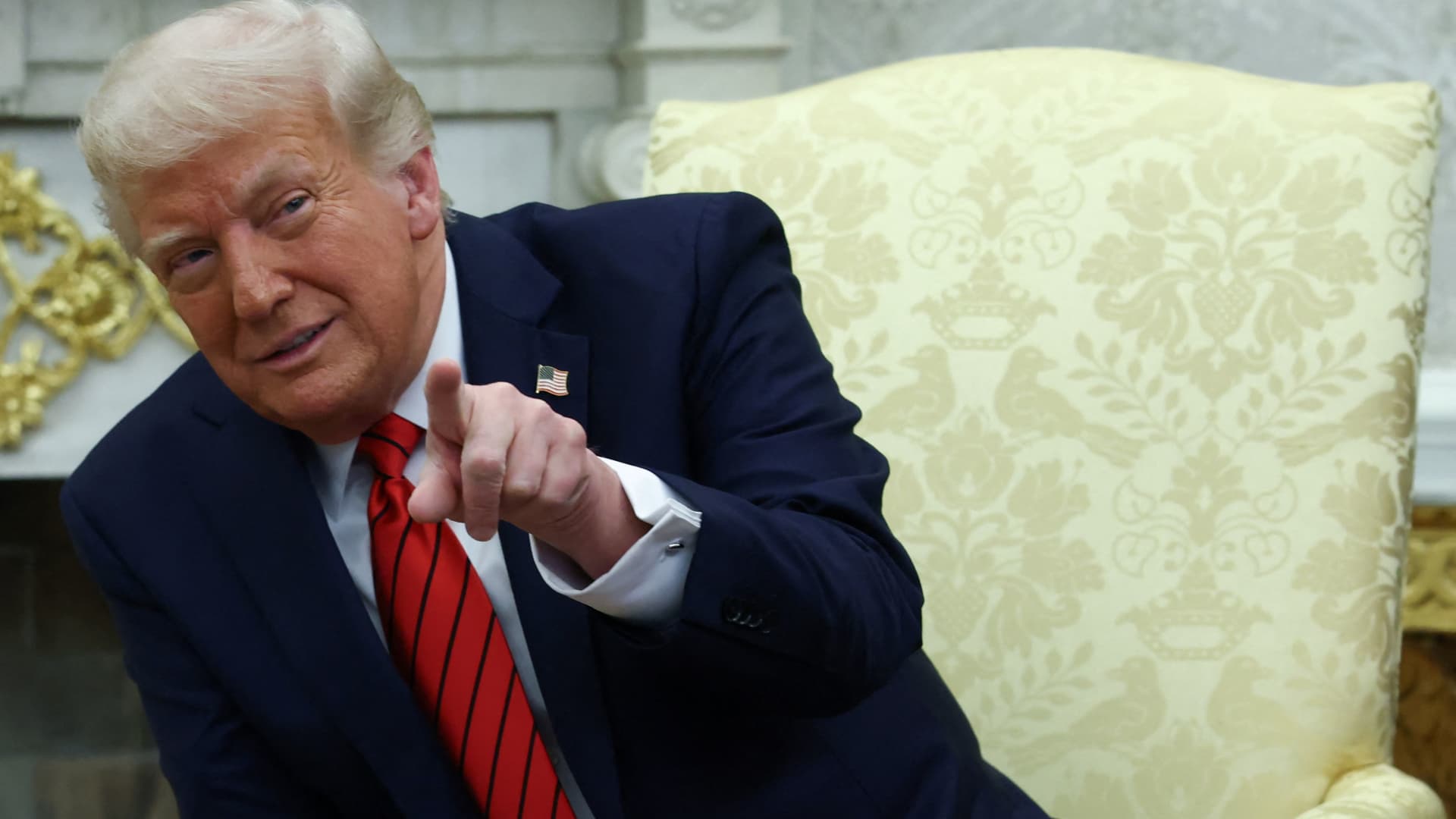U.S. President Donald Trump speaks as he meets with Italian Prime Minister Giorgia Meloni (not pictured) in the Oval Office at the White House in Washington, D.C., U.S., April 17, 2025.
Evelyn Hockstein | Reuters
Yesterday’s edition of this newsletter cautioned that U.S. President Donald Trump’s desire to intervene in the Federal Reserve, as he expressed to reporters on Friday, could result in upheaval in the markets. That didn’t happen because markets were closed for the Good Friday holiday.
On Monday, trading resumed. So have Trump’s attacks on the central bank — and, more pointedly, on Fed Chair Powell, describing him as “Mr. Too Late” and “a major loser” for not cutting interest rates. Trump appointed Powell to the Federal Reserve’s highest seat in his first presidential term during 2017.
With no market closure to shield shares from Trump’s threats, investors unloaded their stocks. All major U.S. indexes fell, weighed down by steep declines in the “Magnificent Seven” group of shares. The U.S. dollar weakened to a three-year low while gold prices hit a new high, suggesting, in combination, that global investors are losing confidence in the U.S. economy and reallocating their capital to safer assets shielded from Trump.
What you need to know today
Trump escalates attacks on Powell
U.S. President Donald Trump on Monday renewed and escalated his attacks on Federal Reserve Chair Jerome Powell. ″’Preemptive Cuts’ in Interest Rates are being called for by many,” Trump said on Truth Social. “There can be a SLOWING of the economy unless Mr. Too Late, a major loser, lowers interest rates, NOW,” Trump wrote, referring to Powell. On Friday, Trump also called for Powell to cut rates.
Stocks and U.S. dollar fall as gold hits high
Stocks in the U.S. fell Monday. The S&P 500 lost 2.36%, the Dow Jones Industrial Average tumbled 2.48% and the Nasdaq Composite was down 2.55%. The ICE U.S. Dollar Index fell as low as 97.92 on Monday, the lowest level since March 2022, according to FactSet. Gold prices jumped to $3,452.30 per ounce, a fresh record. Asia-Pacific markets traded mixed Tuesday. Hong Kong’s Hang Seng Index climbed nearly 0.5% but Japan’s Nikkei 225 declined roughly 0.2%. The Bank of Japan will likely pause rate hikes in its May meeting, said Moody’s Analytics.
Shares of Tesla drop before earnings
Tesla shares fell almost 6% on Monday, a day ahead of its first-quarter earnings report. The stock is now down 44% for the year after wrapping up their worst quarter since 2022 in March. In the online forum that Tesla solicits investor inquiries before its earnings calls, one investor, referring to CEO Elon Musk, asked, “What steps has the board of directors taken to mitigate the brand damage caused by Elon’s political activities?”
Vance and Modi optimistic on deal
India’s Prime Minister Narendra Modi met U.S. Vice President JD Vance, who was in India for a mostly personal trip, in the nation’s capital on Monday. A statement from Modi’s office said the two leaders “welcomed the significant progress in the negotiations for a mutually beneficial India-U.S. Bilateral Trade Agreement.” On Monday, U.S. Trade Representative Jamieson Greer said both countries have “finalized the terms of reference to lay down a roadmap for the negotiations on reciprocal trade.”
Nomura to buy parts of Macquarie
Japanese investment bank and brokerage group Nomura said Tuesday it will buy the U.S. and European public asset management businesses of Macquarie, an Australian investment banking company, for $1.8 billion. The all-cash deal is expected to close by the end of this year, subject to regulatory approvals.
[PRO] Markets could have ‘severe’ reaction to Trump
Stocks and bonds would likely have a “severe reaction” and sell off sharply if Trump makes a move to get rid of Federal Reserve Chair Jerome Powell, Evercore ISI’s vice chairman, Krishna Guha, told CNBC’s “Squawk Box” Monday. While Powell has said he doesn’t believe the president can legally remove the Fed Chair, Guha highlighted one way that Trump can pressure Powell without firing him.
And finally…
Nurphoto | Nurphoto | Getty Images
As the dollar falters, the world’s central banks tread a tightrope — devalue their currency or not
Uncertainty about U.S. policymaking has led to a flight from the greenback and Treasurys in recent weeks, with the dollar index weakening more than 9% so far this year. The drop in the U.S. dollar has led other currencies to appreciate against it, especially safe havens such as the Japanese yen, the Swiss franc and the euro.
While a stronger local currency might help tame inflation through cheaper imports, it complicates export competitiveness particularly under renewed U.S. tariffs, said Thomas Rupf, VP Bank’s co-head for Singapore and Asia chief investment officer.
Currency devaluation is likely to be more of an active consideration across emerging markets, particularly in Asia, said Nick Rees, head of macro research at Monex Europe. However, those countries and Asian central banks will need to tread a fine line to avoid capital flight and other risks.





